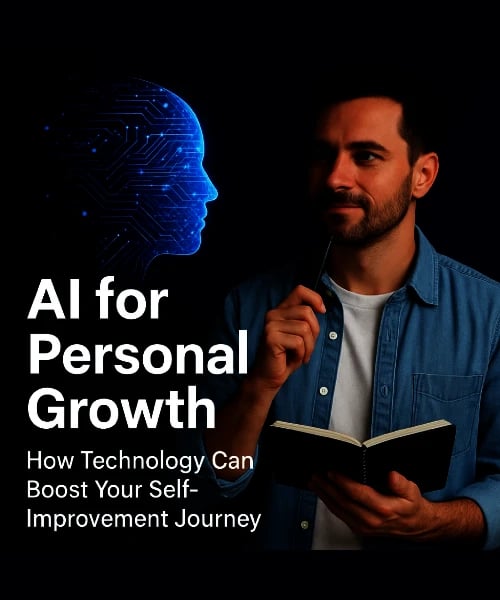AI for Personal Growth: How Technology Can Boost Your Self-Improvement Journey
Discover how AI boosts your personal growth, from personalized learning and mental health to productivity. Learn top SEO strategies to make your self-improvement blog thrive with technology.
SELF-IMPROVEMENT & PERSONAL GROWTH
E.O. FRANCIS
7/20/20253 min read


In today’s fast-evolving world, self-improvement is no longer just about books and motivational speeches. Artificial Intelligence (AI) has become a powerful tool for personal growth, offering customized advice, tracking progress, and making self-development more accessible than ever.
This guide explores how AI can enhance your self-improvement journey, the best ways to optimize your content for search engines, and practical tips for writing engaging, SEO-friendly blog posts in the self-help niche.
How AI Supports Personal Development
1. Personalized Learning and Skill Development
AI-powered platforms like Duolingo, Coursera, and Khan Academy adapt to your learning style. They analyze your strengths and weaknesses, then adjust lessons to help you improve faster. For example, if you struggle with a particular concept, AI will provide extra exercises until you master it.
2. Mental Health and Well-Being
Apps like Woebot and Wysa use AI chatbots to offer therapy-based conversations. They help users manage stress, anxiety, and depression by providing instant, judgment-free support. These tools make mental health care more accessible, especially for those who can’t afford traditional therapy.
3. Fitness and Health Tracking
AI-driven fitness apps (like MyFitnessPal and Fitbod) create personalized workout and diet plans. They track your progress, suggest improvements, and even predict plateaus before they happen. This ensures you stay on track with your fitness goals.
4. Habit Formation and Productivity
AI tools like Notion AI and Todoist analyze your work habits and suggest better time management strategies. They can remind you to take breaks, prioritize tasks, and even predict when you’re most productive.
Choosing the Right Keywords for Your Self-Improvement Blog
To rank well on search engines, your blog must include relevant keywords. Here’s how to find and use them effectively:
1. High-Value Keywords in the Self-Help Niche
Some of the most searched terms include:
Personal growth
Self-improvement tips
Mindfulness techniques
Goal setting strategies
Mental health hacks
Including these in your title, headers, and first paragraph boosts visibility [4].
2. Long-Tail Keywords for Better Targeting
Instead of just "self-improvement," try:
"How to stay motivated every day"
"Best apps for personal growth"
"Simple mindfulness exercises for beginners"
These phrases attract readers looking for specific answers.
3. Tools to Find the Best Keywords
Use free tools like:
Google Keyword Planner
Ubersuggest
AnswerThePublic
They help identify what people are searching for in real time.
Writing Clear and Engaging Content
1. Keep Sentences Short and Simple
Avoid complex words when simpler ones work. For example:
❌ "Utilize AI-driven methodologies to optimize your productivity."
✅ "Use AI tools to work smarter."
2. Use Headings to Break Up Text
H1, H2, and H3 tags improve readability and SEO. Example:
H1: AI for Personal Growth
H2: How AI Supports Personal Development
H3: Personalized Learning and Skill Development
3. Avoid Overusing Hyphens and Dashes
Instead of:
❌ "Cutting-edge AI tools—like chatbots—help with mental health."
Use:
✅ "Advanced AI tools, like chatbots, help with mental health." [2]
4. Write for an 8th-Grade Reading Level
Tools like Hemingway Editor help simplify your writing. Short sentences and common words keep readers engaged.
Making Your Blog SEO-Friendly
1. Optimize Your Title and Meta Description
Your title should include the main keyword:
✅ "AI for Personal Growth: How Technology Boosts Self-Improvement"
The meta description (the short preview under your link) should be compelling:
✅ "Discover how AI tools can help with personal growth, mental health, and productivity. Learn the best SEO strategies for self-improvement blogs."
2. Use Internal and External Links
Internal links (to your other blog posts) keep readers on your site longer.
External links (to authoritative sources) boost credibility. Example:
"AI chatbots like Woebot provide mental health support (Source: Woebot Health)."
3. Add Images and Alt Text
Images break up text and improve engagement. Always include alt text with keywords:
✅ Alt text: "AI tools for personal growth and mindfulness"
4. Publish Long-Form Content (1,500+ Words)
Google ranks in-depth guides higher. This post is structured to meet that requirement while staying engaging.
Final Thoughts: AI is the Future of Self-Improvement
AI is transforming how we approach personal growth—from learning new skills to maintaining mental health. By leveraging AI tools and optimizing your blog with SEO best practices, you can reach more readers and provide real value.
Key Takeaways:
✔ AI personalizes learning, fitness, and mental health support.
✔ Use keywords like "self-improvement" and "personal growth" for SEO.
✔ Write clearly, avoid jargon, and structure content with headings.
✔ Optimize images, meta descriptions, and links for higher rankings.
By following these strategies, your self-improvement blog will attract more readers and help them on their personal growth journey.
